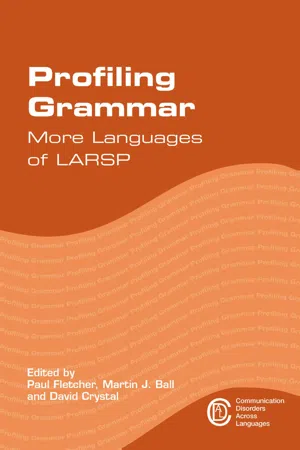
- English
- ePUB (mobile friendly)
- Available on iOS & Android
About this book
This book brings together twelve previously unpublished language profiles based on the original Language Assessment, Remediation and Screening Procedure (LARSP). The languages featured are: Afrikaans, Bulgarian, Cantonese, Finnish, Greek, Hindi, Hungarian, Japanese, Kannada, Korean, Malay and Swedish. Each chapter includes a grammatical sketch of the language, details of typical language development in speakers of the language, as well as a description of and justification for the profile itself. The book will be an invaluable resource for speech-language pathologists and others wishing to analyse the grammatical abilities of individuals speaking one of these languages. This new collection complements a previous book in this series on the same theme: Assessing Grammar: The Languages of LARSP (Ball et al., 2012,).
Frequently asked questions
- Essential is ideal for learners and professionals who enjoy exploring a wide range of subjects. Access the Essential Library with 800,000+ trusted titles and best-sellers across business, personal growth, and the humanities. Includes unlimited reading time and Standard Read Aloud voice.
- Complete: Perfect for advanced learners and researchers needing full, unrestricted access. Unlock 1.4M+ books across hundreds of subjects, including academic and specialized titles. The Complete Plan also includes advanced features like Premium Read Aloud and Research Assistant.
Please note we cannot support devices running on iOS 13 and Android 7 or earlier. Learn more about using the app.
Information
Table of contents
- Cover-Page
- Half-Title
- Series
- Title
- Copyright
- Contents
- Contributors
- Introduction
- 1. Afrikaans LARSP: Past and Future?
- 2. Gr-LARSP: Towards a Greek Version of LARSP
- 3. Swe-LARSP: A Grammatical Profile of Swedish
- 4. FIN-LARSP: Morphosyntactic Profiling of Finnish Children
- 5. HU-LARSP: Assessing Children’s Language Skills in Hungarian
- 6. Grammatical Profile of Hindi: H-LARSP
- 7. K-LARSP: A Grammatical Profile of Kannada
- 8. Profiling Malay Children’s Syntactic Development: A Malay-LARSP
- 9. Cantonese LARSP: A Procedure for Assessment and Remediation for Cantonese-speaking Children
- 10. Japanese: Devising the J-LARSP
- 11. Korean Language Assessment, Remediation and Screening Procedure
- 12. Language-specific Issues for the Bulgarian LARSP Profile and Adult Aphasia Examinations
- 13. Complex Sentences in Development and Impairment: Stage V Revisited
- Author Index
- Subject Index